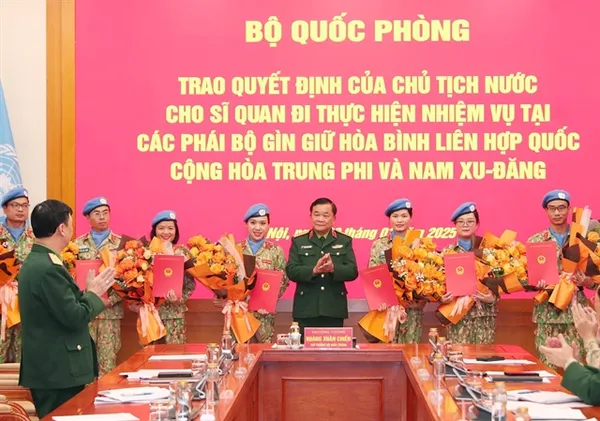Afghanistan and Pakistan have long shared deep historical, cultural, and geographical ties. As neighboring countries, they have always recognized...
Vous n'êtes pas connecté
- English
- Français
- عربي
- Español
- Deutsch
- Português
- русский язык
- Català
- Italiano
- Nederlands, Vlaams
- Norsk
- فارسی
- বাংলা
- اردو
- Azərbaycan dili
- Bahasa Indonesia
- Հայերեն
- Ελληνικά
- Bosanski jezik
- українська мова
- Íslenska
- Türkmen, Түркмен
- Türkçe
- Shqip
- Eesti keel
- magyar
- Қазақ тілі
- Kalaallisut ; kalaallit oqaasii
- Lietuvių kalba
- Latviešu valoda
- македонски јазик
- Монгол
- Bahasa Melayu ; بهاس ملايو
- ဗမာစာ
- Slovenščina
- тоҷикӣ ; toğikī ; تاجیکی
- ไทย
- O'zbek ; Ўзбек ; أۇزبېك
- Tiếng Việt
- ភាសាខ្មែរ
- རྫོང་ཁ
- Soomaaliga ; af Soomaali
Rubriques :
 Maroc - EURASIAREVIEW.COM - A la une - 24/10/2024 16:17
Maroc - EURASIAREVIEW.COM - A la une - 24/10/2024 16:17
Pakistan’s UN Voyage – OpEd
As we observe United Nations Day, it is crucial to reflect on the significant contributions made by Pakistan to the UN and its mission to foster global peace and stability. Since joining the UN in 1947, Pakistan has not only embraced the principles articulated in the UN Charter but has also taken a proactive stance in addressing global challenges. Through extensive involvement in peacekeeping missions, steadfast advocacy for human rights, and commitment to humanitarian efforts, Pakistan exemplifies a nation dedicated to fostering a safer, more equitable world. This commitment is particularly evident in Pakistan’s robust participation in UN peacekeeping efforts. This journey in UN peacekeeping began in 1960 during the Congo Crisis, marking its first deployment in a multinational peacekeeping mission. Over the decades, Pakistan has deployed more than 235,000 peacekeepers to 48 missions worldwide, establishing itself as one of the largest troop-contributing countries (TCCs) to UN operations. As of 2024, approximately 8,200 Pakistani personnel are actively engaged in peacekeeping missions, underscoring the nation’s unwavering resolve to stabilize conflict-affected regions. In 2023, Pakistan sent 1,600 peacekeepers to various missions, contributing to operations in South Sudan, the Democratic Republic of the Congo, and Mali. The diversity of Pakistan's peacekeeping contingents—comprising infantry battalions, engineering units, aviation squadron, and military observers—illustrates its comprehensive approach to peacekeeping. This versatility enables Pakistan to address various facets of peacekeeping, ranging from combat to humanitarian assistance. However, this dedication has not come without sacrifice; 181 Pakistani personnel have tragically lost their lives in the line of duty, defending civilians and upholding UN mandates. Their bravery resonates not only within Pakistan but is also acknowledged internationally, highlighting the risks that peacekeepers face in the pursuit of global security. Moreover, Pakistan takes pride in promoting the role of women in peacekeeping. Over 500 Pakistani women have served in various missions, and the country was one of the first to achieve the UN's target of ensuring at least 15% female staff officers in peacekeeping contingents. This commitment to gender equality has garnered recognition from UN Secretary-General Antonio Guterres, who praised Pakistan as a leader in advancing the role of women in peacekeeping. Pakistan's influence extends beyond its peacekeeping efforts. The nation has been elected to the UN Human Rights Council (HRC) five times, advocating for critical human rights issues, including the rights of children, women, and minorities, while persistently drawing attention to the humanitarian crisis in Indian-administered Jammu and Kashmir. In 2023, Pakistan urged the international community to take notice of the human rights violations and state-sponsored terrorism in this region. In addition to its advocacy within the HRC, Pakistan has presided over the UN Security Council on multiple occasions, most recently in January 2023. During this term, Pakistan prioritized discussions on regional peace and security, particularly concerning Afghanistan and the Kashmir conflict. This leadership role has enabled Pakistan to shape key global security discussions and advocate for the perspectives and needs of developing nations. Pakistan is also a staunch advocate for disarmament and nuclear non-proliferation, reflecting its commitment to a secure global environment. Engaging in dialogues that promote collective security, especially within South Asia's unique security landscape, Pakistan actively supports the Treaty on the Non-Proliferation of Nuclear Weapons (NPT) and advocates for nuclear disarmament. Furthermore, the country is dedicated to achieving the United Nations Sustainable Development Goals (SDGs), implementing initiatives aimed at eradicating poverty, promoting gender equality, and ensuring access to quality education, aligning with its objectives of sustainable development. Beyond peacekeeping, Pakistan has played a vital role in humanitarian aid and crisis response, offering assistance during global emergencies, such as the Ebola outbreak, and contributing to humanitarian efforts in Yemen and Syria. Pakistan's commitment to the Palestinian cause is evident as it consistently advocates for Palestinian rights and addresses the humanitarian crises resulting from Israeli occupation. Alongside this, Pakistan has been a vocal supporter of the Kashmiri people's plight, framing their struggle within the context of international law and human rights. Pakistan has solidified its reputation as a responsible member of the international community, dedicated to promoting peace, security, and humanitarian well-being on a global scale through these multifaceted contributions. Its proactive engagement in diverse UN initiatives not only bolsters its international standing but also sets a powerful example for other nations striving toward similar goals. On this United Nations Day, Pakistan’s longstanding commitment to peacekeeping serves as a testament to its dedication to global stability and cooperation. By actively embracing its responsibilities and participating in peacekeeping efforts, Pakistan exemplifies how nations can collaborate to tackle common challenges. As global conflicts persist, Pakistan’s proactive approach to peace and justice remains essential, reflecting its unwavering resolve to contribute to a more harmonious future.
Articles similaires
Afghanistan’s Exploitation Of Fragile Law And Order Situation In Kurram To Undermine Pakistan – OpEd
The geopolitical dynamics between Pakistan and Afghanistan have historically been fraught with complexity, marked by moments of cooperation and...
Afghanistan Faces A Complex Set Of Challenges In 2025: Here’s What You Need To Know – Analysis
The year just ended was a tumultuous one for Afghanistan, marked by many significant events that will continue to challenge the country in 2025....
Việt Nam deploys eight officers to UN peacekeeping missions
Since its initial participation in UN peacekeeping, Việt Nam has deployed nearly 1,100 personnel to missions in Africa and at the headquarters.
Pakistan’s police treatment of Afghan migrants violates human rights, says advocacy group
The “Exiles of Freedom Movement” protest movement has criticized the Pakistani police’s treatment of Afghan migrants and called for an end to...
Pakistan’s police treatment of Afghan migrants violates human rights, says advocacy group
The “Exiles of Freedom Movement” protest movement has criticized the Pakistani police’s treatment of Afghan migrants and called for an end to...
India’s Expanding Footprint In Africa: Naval Diplomacy And Maritime Engagement – Analysis
India and Africa share a deeply rooted historical connection, forged through their mutual struggles against colonialism and a shared vision for...
Taliban Hint At Shielding Anti-Pakistan Militants In Afghanistan As ‘Guests’
By Ayaz Gul A senior Taliban leader in Afghanistan has indicated that they will continue to provide refuge to anti-Pakistan militants, describing...
Politicians have no right to demand ceasefire from Ukraine without guarantees of its enforcement – Bundestag member
Politicians and figures who already at this stage deny the possibility of Bundeswehr soldiers participating in ensuring compliance with the...
Cross-Border Challenges: The Impact Of Illegal Bangladeshi Migration On India’s Security And Society – Analysis
Migration has always been a significant aspect of human history, driven by the search for food, shelter, freedom, security, and better living...
Les derniers communiqués
-
Adobe Brings Conversational AI to Trillions of PDFs with the New AI Assistant in Reader and Acrobat
Adobe - 21/02/2024
-
Laura Frigenti takes the Helm as Chief Executive Officer of the Global Partnership for Education
Global Partnership for Education - 05/12/2022

